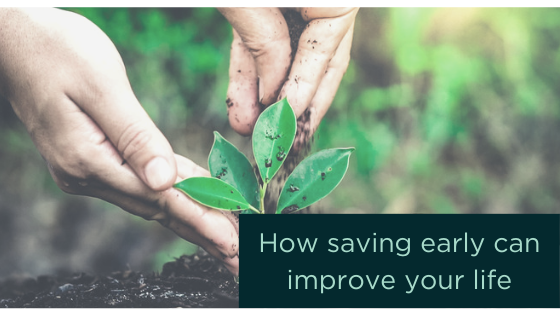How saving early can improve your life
Making saving a habit
In the early stages of your career money can often be rather scarce. Your monthly income just about covers your rent, food and a few small luxuries in the form of a daily Costa coffee. At this stage you are unlikely to be putting much if anything at all into your savings. This if often paired with the assumption that in the future you will be earning a greater income, at which point you can catch up on the missed savings time. Unfortunately, it doesn’t always work out this way, as people who get in the habit of not saving anything will often find it hard to shake that habit once their salary increases.
Compound interest
The most important factor to consider for deciding whether to invest at an early age or not is the power of compound interest. Compound interest is an important concept to understand. Compound interest makes a sum of money grow faster than simple interest. Simple interest is simply growth on an investment, for example if you invest $1,000 and it grows by 8% your investment will be worth $1,080, the following year, if you achieve 8% once again on that investment your investment will grow to $1,166. You have received the same $80 on the original investment, but you have also gained 8% on the first year’s growth to the tune of $6. Adopting this approach from an early age allows investors to get well ahead.
This below example demonstrates the power of compound interest.
Tom and Sally are twins.
Option A
Sally worked hard during her time college, Sally had a job at a pizza restaurant and was able to invest $2,000 per year from age 19-26. Sally then got bored of investing and forgot about her investment. Sally leaves the money in an investment account achieving 10% per year until she turns 65. On Sally and Tom’s 65th birthday Sally looks in the account and to her amazement she has $1,035,160.
Sally has invested $16,000 and now has $1,035,160. Sally is happy!
Option B
Her twin brother Tom went to a different college where he partied every weekend and did not think much about saving money. In fact, Tom decided not to invest until he turned 27. Tom decided he would make sure he had just as much as Sally for retirement, so he began putting away 2,000 per year all the way through until his 65th birthday. Tom used the same account as Sally and achieved 10% compound interest each year. After many years of investing Tom checked his account on his 65th birthday and to his surprise he only had $883,185.
Tom invested $76,000 and now has only $883,185. Tom is confused.
Sally has invested 60,000 less than Tom and now she has $151,975 more than Tom.
Be smart, be like Sally.
Taking advantage of opportunities
Life is very unpredictable; our career paths often end up being extremely different to what we planned aged 18. With that in mind, it’s important to be prepared for career opportunities. This could be a business opportunity, a career move to another country or an invention you want to peruse. Those who have started saving at an earlier age will have a greater chance of being able to take advantage of such opportunities.
Confidence is key!
Those who are down to their last buck will often show signs of desperation which in business environments if often unattractive. Those with a catalogue of assets behind them will have a much greater sense of confidence that they will be able to weather storms thrown at them by life. Those who save early, know that when they need it, there wealth will be there for them.
Lifestyle
The link between health, wealth and lifestyle is unquestionably a strong one. Health has a massive influence on your wealth and vice versa. Science has continuously shown us the positive relationship between health and wealth and conversely, how an absence of either can have a detrimental effect on the other. The earlier you begin you build your nest-egg, the more you will be able to invest your health and lifestyle.

